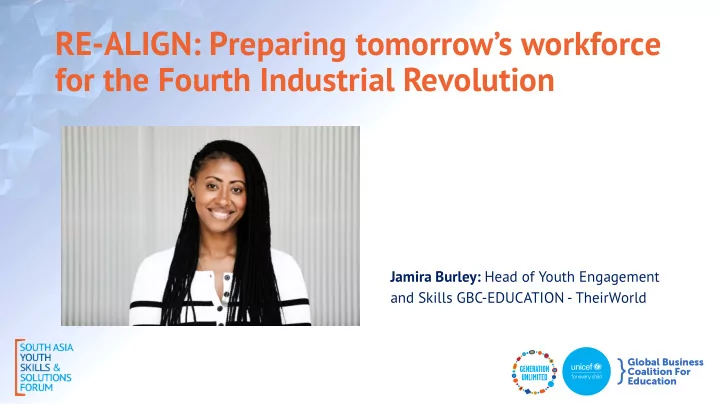

RE-ALIGN: Preparing tomorrow’s workforce for the Fourth Industrial Revolution Jamira Burley: Head of Youth Engagement and Skills GBC-EDUCATION - TheirWorld } Global Business Coalition For Education
A frame work for action: Timeline 2018 Report released 2017 launched the “ Preparing Regionalize –Localize Youth Skills and tomorrow’s workforce impact Innovation Initiative for the 4ir” } Global Business Coalition For Education
By 2030, more than half a generation of young people will not have the skills needed for the changing global job market. That is more than 800 million out of 1.6 billion children and young people globally. That sits as a daunting backdrop to the fact that nearly 50% of the jobs we are training young people for today, will not exist when they enter the workforce. } Global Business Coalition For Education
A frame work for action: Our Methodology • Literature Review • How do we address the 1.8 billion young people What is the challenge? coming into the workforce between now and 2030?? • Interviews with Industry Leaders, Innovators, Global Leaders, Researchers, • What skills are needed and valued in 4IR? How does 4IR change Non-profits, and Youth the game? • What is now possible thanks to 4IR? • Focus Groups • What work readiness skills are needed? What skills are needed in the new world of • What core skills are needed? • Global Survey: 531 participants from 45 work? • What domain-specific skills are needed? countries • Can these models be scaled? What current models are working? • How can they be scaled for impact? What new models are • Can these models be scaled? emerging? • How can they be scaled for impact? Limitations: limited sample size, self-reported What are the opportunities for • Can these models be scaled? nature of information, challenges reaching the business to make an impact while engaging youth? • How can they be scaled for impact? “most marginalized populations” } Global Business Coalition For Education
A frame work for action: Challenges The report identifies four primary challenges that business leaders and other stakeholders should address within the larger context of youth workforce development: 01 Reimagine 4IR as a unique opportunity to be welcomed , not a problem to be confronted 02 Reposition discrete and disconnected programs as a systemwide, unified set of approaches 03 Realign toward achieving both scale and impact , rather than framing solutions as scale versus impact 04 Reframe the possibilities for marginalized youth , including those who historically have been difficult to reach, with particular attention to women and girls } Global Business Coalition For Education
A frame work for action: Skills Te Teaching and training Sk Skill categories Pu Purpose methodolo me logy To support youth in finding and securing employment, and Wo Workforce readiness succeeding within the workplace • Team-based To support youth as they integrate and collaborate with internal Project-based • and external workplace stakeholders, such as customers, co- So Soft skills Practical application • workers, and management • Experiential • Case simulation To give youth technical or domain expertise to perform job- • Business exposure Technical skills Te specific tasks Job shadowing • Mentorship • To support youth in establishing their own business, supporting • Coaching entry into freelance, contract work, or gig work, and/or En Entrepr prene neur urshi ship developing as a self-starter within a work environment Li Lifelong learning: A continuous process of gaining new knowledge and skills as individuals progress through their professional and personal careers } Global Business Coalition For Education
A frame work for action: Recommendations The report makes fo four key recommendations to drive change, as business accelerates its role: 01 Align stakeholders’ objectives and approaches Work with the broader ecosystem to align goals and outcomes for impact. 02 Engage in public policy Strategically engage in public policy through dialogue, advocacy, collaboration, and influence. 03 Develop strong talent strategies Analyze current talent strategies—particularly those focused on youth or under-represented populations—and implement best practices to promote inclusivity and innovation, and drive economic return through differentiation. 04 Invest in workforce skilling Evaluate, invest, and promote workforce training programs that align with your corporate social responsibility goals, talent practices, skill needs, and corporate culture. } Global Business Coalition For Education
A frame work for action: Next Steps 2030 Action Global Hub Summits Skills Friendly Cities Initiative } Global Business Coalition For Education
A frame work for action: Join The Movement • Make a pledge aligned with one or more of the recommendations outlined in the report • Agree to sponsor one of our global/regional skill summits • Lend your voice and share the report with your network • Become a member } Global Business Coalition For Education
RE-ALIGN: Preparing tomorrow’s workforce for the Fourth Industrial Revolution Jamira Burley: Head of Youth Engagement and Skills GBC-EDUCATION – TheirWorld Jamira@gbc-education.org } Global Business Coalition For Education
Recommend
More recommend